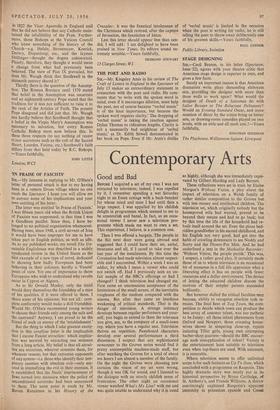'IN PRAISE OF FASCISTS' SIR.—My lateness in replying to Mr.
O'Hara's letter of personal attack is due to my having been in a remote Druze village where no one reads the Spectator. I hope you will allow me to correct some of his implications and your own entitling of his letter.
The letter was entitled 'In Praise of Fascists.' I was fifteen years old when the British Union of Fascists was suppressed; at that time I was a Gandhian pacifist. Since then, I have be- longed to no political organisation whatsoever. Having been, since 1948, a civil servant of Iraq it would have been improper for me to have taken part in English politics, as well as idle. As to my published works, my novel The Un- suitable Englishman was described in a widely Syndicated review in the United States as the best example of a new type of novel, dedicated to showing how badly Europeans had been behaving in their colonies; hardly a 'Fascist' point of view. Yet one of importance to those Europeans who wish to understand why revolts occur in Cyprus or Algiers.
As to Sir Oswald Mosley, only the timid would deny themselves the friendship of a man of his qualities, if it were offered to them. I share some of his opinions; but not all: com- plete conformity would make a dull friendship. Would Mr. O'Hara recommend young writers to choose their friends only among the safe and the castrated? Anyway, I am proud to be the friend of such an enemy of the 'establishment:
But the thing to which I take greatest excep- tion in this simpliste letter is the implication that I excuse Fascist atrocities: which implica- tion was secured by extracting one sentence from a long article. My belief is that all atroci- ties are atrocious, whoever commits them, for Whatever reason; but that extremist opponents of any system—i.e. those who identify their tem- porary enemies with absolute evil—only suc- ceed in intensifying the evil in their enemies. It is established that the Nazis' imprisonment of Jews turned into massacre when the policy of unconditional surrender had been announced to them. The same point is made by Mr. Steven Runciman in his History of the Crusades: it was the fanatical intolerance of the Christians which revived, after the capture of Jerusalem, the fanaticism of Islam.
Lest this letter should appear less than can- did, I will add: I am delighted to have been praised in New Times. Its editors sound ex- tremely sensible.—Yours faithfully, 13 Clarges Street, W1 DESMOND STEWART


















































 Previous page
Previous page